IMT School for Advanced Studies Lucca
IMT School for Advanced Studies Lucca (Italian: Scuola IMT Alti Studi Lucca, abbreviated to IMT School or IMT Lucca) is a superior graduate school in Lucca, Italy.[1] IMT School was founded in 2005 under the name IMT Institute for Advanced Studies Lucca, with the acronym "IMT" standing for "Institutions, Markets, Technologies." Its main campus is located in the San Francesco Complex within the historic walls of Lucca.
Scuola IMT Alti Studi Lucca | |
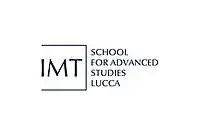 | |
| Type | Public |
|---|---|
| Established | 2005 |
| Director | Pietro Pietrini |
| Address | Piazza San Ponziano, 6 , Lucca |
| Campus | Urban |
| Working language | English |
| Website | www |
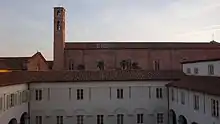
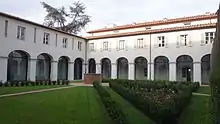
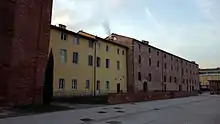
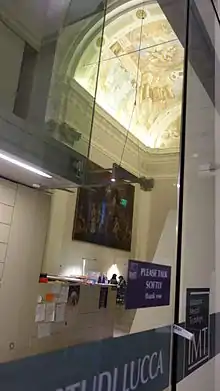
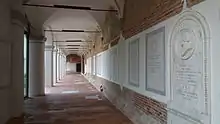
As an institution for advanced study, IMT School is home to researchers who carry out highly interdisciplinary work leading to the development of new knowledge (first role: basic science). The School's main campus, established on the grounds of an ex-monastery, fosters the continual presence of visiting scholars that, alongside prominent residing faculty, contribute to an intellectually lively environment. At the same time, IMT School is an institution of technology aiming to apply cutting-edge scientific achievements to solve practical problems of economic, industrial, and societal meaning (second role: applied science). Perhaps most importantly, IMT School's final role is that of a PhD-awarding institution where expertise is transmitted to future academics, researchers, and impactful decision makers.
Although IMT School is relatively young and limited in faculty and student number, it has attracted significant attention from both national and foreign media.[2] Its international advisory board includes a number of renowned intellectuals, such as H. Eugene Stanley, Sanjoy K. Mitter, or Gerard Roland. The School has also been performing commendably in national and international research rankings alike. For several years, it has been ranked as the top institution in economics and statistics in Italy, and one of the top institutions in Europe and worldwide, founded post-1980.
History
The desire of Lucca to have its own university dates back to 1369, when Emperor Charles IV gave an official dispensation to the Republic of Lucca to establish a "Studium Generale" in the city. In 1387 this concession was countersigned and confirmed by Pope Urban VI, yet despite these attempts, the university never succeeded and eventually failed. A second attempt to establish a University of Lucca was made in 1785 and was slightly more successful offering courses in Law, Medicine, Mathematics, Engineering and Philosophy. This university was reformed during the Duchy of Maria Luisa of Spain, where it became the "Real Liceo" however the history of the Real Liceo was interrupted in 1847, following the incorporation of the Duchy of Lucca into the Grand Duchy of Tuscany in 1847, disappearing definitively in 1867 shortly before the completion of the Risorgimento. IMT thus represents the third attempt to found a university in Lucca and was established by ministerial decree in November 2005 as an Institute for Advanced Studies.[3]
Academics
The two PhD programmes of IMT School - (1) Systems Science and (2) Cognitive and Cultural Systems - integrate competences across economics, engineering, computer science, physics, mathematics, statistics, philosophy, psychology, neuroscience, psychiatry, history, and cultural studies. Originally envisaged as three-year scholarships, since 2019, the programmes are articulated in curricula of four years, and they divide into four Tracks, which are not only fully funded but also entail accommodation and daily meals at the School's canteen. The Tracks currently offered are field-specific, although in many instances, they share a common academic background. Candidates may apply to one (or more) of the following Tracks:
- Economics, Networks and Business Analytics
- Computer Science and Systems Engineering
- Cognitive, Computational and Social Neurosciences
- Analysis and Management of Cultural Heritage
IMT School recruits both its students and faculty on a competitive international basis, evaluating, among others, the capacity to publish in world-class peer-reviewed journals. The pillars of the School's research model are its thematic Research Units that often cooperate in interdisciplinary projects:
- AXES - Laboratory for the Analysis of Complex Economic Systems
- DYSCO - Dynamical Systems, Control, and Optimization
- LYNX - Center for the interdisciplinary Analysis of Images
- MUSAM - Multi-Scale Analysis of Materials
- NETWORKS - Complex Networks
- MOMILAB - Molecular Mind Laboratory
- SysMA - System Modelling and Analysis
Rankings
In 2013, IMT School's division of economics (including the areas of political economy and statistics) came out first in the ranking of Italian economics departments.[4]
In 2015, the School was ranked as one of the top young research institutions in Europe in U-Multirank, the official ranking of the European Commission.[5]
In 2016, the School once again confirmed its standing in Europe, placing first among all research institutions in Italy, and third in Europe among research institutions established post-1980.[6]
In 2016, the School topped the ANVUR research rankings in the areas of economics and statistics.
In the 2017 edition of U-Multirank, the School was ranked 8th among the world research institutions established post-1980 (251 institutions included).[7]
Selectivity
In 2016, IMT School received a record of 3747 applications for 34 places, a significant increase compared to 1880 applications in 2015.
In 2017/2018, the School received 2286 applications for 36 PhD positions, bringing its admissions rate up to 1.5%.[8]
Notable Alumni
See also
References
- "IMT School for Advanced Studies Lucca - Scuola di Dottorato IMT Alti Studi di Lucca". Imtlucca.it. 2011-09-29. Retrieved 2011-10-10.
- "IMT Lucca Press Review". Imtlucca.it. 2011-11-12. Retrieved 2011-11-13.
- https://www.imtlucca.it/en/the-imt-school/overview
- http://www.anvur.org/rapporto/files/Universita/29_Lucca-IMT.pdf
- http://www.umultirank.org/#!/printTable?trackType=illustrative&sightMode=undefined&ranking=29&sortCol=sortValues%5B0%5D&sortOrder=asc§ion=illustrativeRanking
- http://www.umultirank.org/#!/printTable?trackType=explore&sightMode=undefined&ranking=6&sortCol=overallPerformance&sortOrder=desc§ion=illustrativeRanking
- http://www.umultirank.org/#!/compare?trackType=compare&sightMode=undefined§ion=compareRanking&mode=likewithlike&instutionalField=true&pref-18=4&sortOrder=desc&sortCol=overallPerformance
- https://www.imtlucca.it/school/phd-statistics
External links
- www.imtlucca.it - Official website